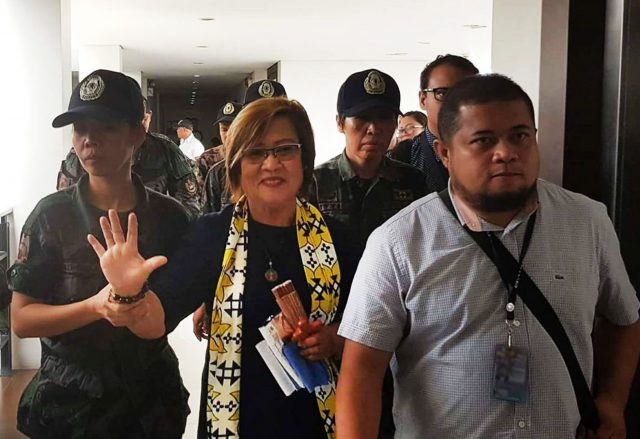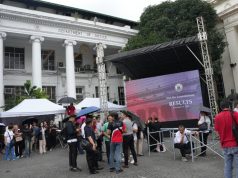
MANILA, Philippines — Solicitor General Jose Calida’s refusal to submit to the Supreme Court official documents on drug war deaths reneged on a promise he made in December and is meant to “cover up” the supposed fact that most of the slain suspects did not fight back as authorities claim, Senator Leila de Lima said.
In her 221st “dispatch from (Camp) Crame,” where she has been detained since last February as she awaits trial on drug charges for her alleged involvement in the drug trade inside the National Bilibid Prison, the outspoken administration critic noted that Calida “agreed to turn over and give official reports and other relevant documents related to the death of around 4,000 drug suspects during police operations” during the high court’s December 5 hearing on petitions questioning the constitutionality of the government’s war on drugs.
The aggressive campaign, which President Rodrigo Duterte vowed to wage when he came into office, has seen thousands of suspected street pushers and users slain either in police operations or in drive-by shootings or vigilante-style executions, with some tallies placing the total at way over 13,000 since July 2016.
This week, however, it was learned that Calida had filed a motion for reconsideration of the Supreme Court order to submit the drug war records, claiming the documents “contain sensitive information that have national security implications.”
The documents are meant to test government’s assertion it is probing what authorities call “deaths under investigation” in the course of the drug war.

“Malinaw na coverup ito dahil pag nabunyag ang mga investigation records na ‘yan, mako-confirm ang matagal na nating hinala na karamihan sa mga napatay na drug suspects ay hindi nanlaban (This is a clear coverup because if these investigation records are divulged, they will confirm long-held suspicions that most of the slain drug suspects did not fight back),” De Lima said.
“Besides, national security is a lame excuse to defy the order of the Supreme Court,” she added. “No national security is involved in ascertaining the legitimacy of these police operations; particularly in light of the magnitude and pervasiveness of the killings.”
This was especially so, she added, with government set to resume the controversial anti-drug campaigns “Oplen Tokhang” and “Double Barrel.”
De Lima, who once chaired the Senate committee on justice and human rights, said she had seen some police reports during a probe into the killings and pointed out that, “I took note of certain entries in a random sampling of SOCO (scene of crime operatives) reports that bear telltale signs of summary execution, and accordingly pushed for a closer scrutiny of said reports, but to no avail.”
She also dismissed Calida’s assertion in refusing to hand over the records that the 1987 Constitution limits people’s right to information “to matters of public concern.”
“Simple lang po ang tanong ko, Solgen, hindi po ba ‘public concern’ ang pagpatay sa libo-libong mga Pilipino lalo na kung mapatunayang labag sa batas at ‘due process’ ang kanilang pagkamatay (My question is simple, Solgen, isn’t the death of thousands of Filipinos of ‘public concern,’ especially if it is proven that their killings violated the law and due process)?” she asked.









